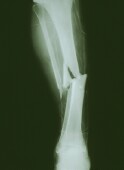
A drug that boosts the body's production of stem cells appears to "jump-start" the bone-healing process to a point that older adults' bones heal as fast as young people's, suggest preliminary results released Tuesday by U.S. researchers.
Researchers at the University of Rochester Medical Center in New York gave teriparatide (Forteo) to 145 people who had bone fractures that had not healed, many for six months or more. They found that 93 percent of them showed significant healing and pain control after eight to 12 weeks.
Teriparatide speeds the healing of fractures by changing the behavior and number of cartilage and bone stem cells involved in the healing process, the researchers found.
"The decreased healing time is significant, especially when fractures are in hard-to-heal areas like the pelvis and the spine, where you can't easily immobilize the bone -- and stop the pain," Dr. Susan V. Bukata, medical director of the university's Center for Bone Health, said in a news release from the center.
"Typically, a pelvic fracture will take months to heal, and people are in extreme pain for the first eight to 12 weeks," she said. "This time was more than cut in half. We saw complete pain relief, callus formation and stability of the fracture in people who had fractures that up to that point had not healed."
Based on the findings, the news release said, the U.S. National Institutes of Health has funded a clinical trial of the drug's use on fractures. The study will include men and post-menopausal women older than 50 who have what's called a low-energy pelvic fracture and who are admitted to the emergency department of Strong Memorial Hospital in Rochester.
Participants in the study will be given either teriparatide or a placebo and will be followed for 16 weeks to measure fracture healing in a number of ways, including pain levels, microscopic bone growth determined through CT scans and functional testing of bone strength.
Teriparatide was approved by the U.S. Food and Drug Administration in 2002 as a treatment for osteoporosis.
If clinical trials prove that the drug speeds bone healing, it could prove especially important for older adults, who suffer the majority of broken bones that heal slowly.
"In many people, as they get older, their skeleton loses the ability to heal fractures and repair itself," J. Edward Puzas, head of orthopedic bone research at the medical center and the lead investigator for the clinical trial, said in the news release. "With careful application of teriparatide, we believe we've found a way to turn back the clock on fracture healing through a simple, in-body stem cell therapy."
Bracing and immobilization cannot be used for the approximately 60,000 Americans who suffer a pelvic fracture each year.
"It takes three to four months for a typical pelvis fracture to heal," Bukata said. "But, during those three months, patients can be in excruciating pain, because there are no medical devices or other treatments that can provide relief to the patient."
"Imagine if we can give patients a way to cut the time of their pain and immobility in half?" she said.
Speeding the healing time for pelvic fractures could also reduce the risk of death and medical costs.
Pelvic fractures carry the same risk of death as hip fractures. About "one-quarter of all older women with pelvic fractures will die from complications," Bukata said. "And during that year of recovery, a patient typically puts a greater strain on our health-care system, not to mention their pain and suffering."




